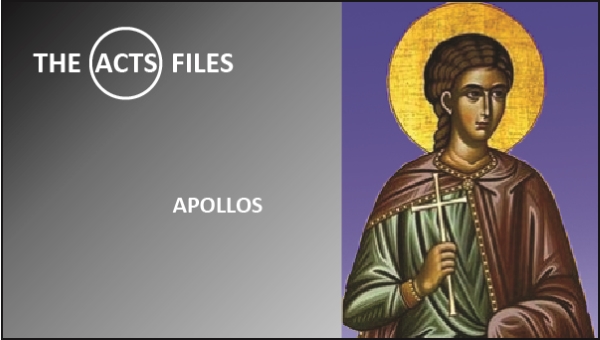By Tyson Thorne

With Paul on his way back to Antioch Syria the story briefly shifts focus on the activity in Ephesus, where Priscila and Aquilla set up their business. Here we are introduced to a man named Apollos. Born to Jewish parents in Alexandria, Egypt he was raised with a cosmopolitan education. The world famous Library of Alexandria was the home of some of the oldest manuscripts, teachings and documents from around the globe. While we know much about the education of Paul, we must make assumptions about Apollos. Those assumptions are based on records of the period about his home town which are known to be accurate, the assumptions are where they are applied to Apollos individually.
Apollos shows a remarkable education. One that appears to be parallel to Paul’s at least as far as Judaism is concerned. Apollos’ education regarding Jesus is somewhat dated, however, and probably stems from disciples of John the Baptist who dispersed following John’s beheading (Matthew 14.10). While Apollos would have understood Jesus to be the promised Messiah, he had not yet heard of the death and resurrection of Jesus or of the spread of the movement to Gentiles.
Like Paul, Apollos ministered primarily in synagogues teaching the people about the Messiah. While in Ephesus Apollos meets up with Paul’s friends the tentmakers and learns the complete news regarding Jesus. His education permits him to put the pieces of the Old Testament teachings regarding the Messiah together with recent events and convinces him all the more that Jesus is whom his people have waited centuries for. He earnestly begins teaching the complete gospel in the synagogue of Ephesus where there was a significant contingent of former followers of John the Baptist. After ministering here he decided to head to Corinth, the city Paul recently spent six months in to plant a healthy church. Apollos would later be credited with the development of the church of Corinth (1 Corinthians 3.6).
A traditional belief starting with Luther is that Apollos is the author of the book of Hebrews. While the apostle Paul is the most popular candidate for author, many have pointed out stylistic differences between it and the rest of Paul’s writings. Since the book of Hebrews is essentially a sermon transcript and not a letter, stylistic differences may be expected. Either of these two men were capable of writing the homily, and is a debate that will likely not be settled on this side of eternity. For romantic rather than evidentiary reasons, I like to think that Hebrews is the sermon Apollos preached to the synagogues of the cities he travelled to, the one that convinced so many that Jesus is the promised Messiah.
While Apollos is not mentioned again in Acts, his impact on the early church was significant all the same. In Paul’s first letter to the Corinthian church he mentions having urged Apollos to visit and strengthen them, though Apollos had other ministry obligations to attend to first. He is mentioned also earlier in that same letter (chapter 3) as a fellow servant and companion in the gospel. Both their ministries in Corinth are equated. We know further from Titus 3.13 that Apollos often traveled to other churches and assisted their growth when Paul could not.
We know nothing else regarding his life. There is no mention of a spouse or children and his independence to travel would indicate he probably had neither. Early church father Jerome writes that Apollos, having become discouraged by the divisions in Corinth (which Paul addresses in 1 Corinthians), traveled to Crete where he spent many years before returning to Corinth and becoming its bishop. There is no record of the time or means of his death.
|
|
|